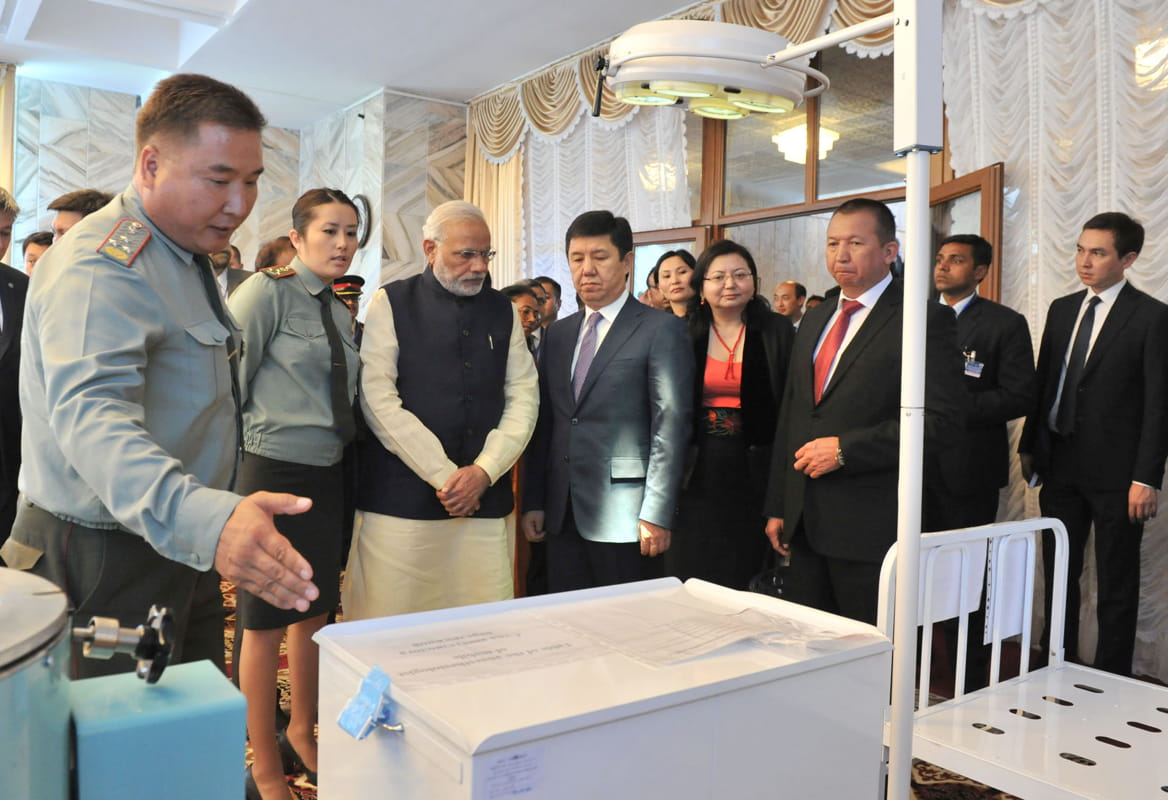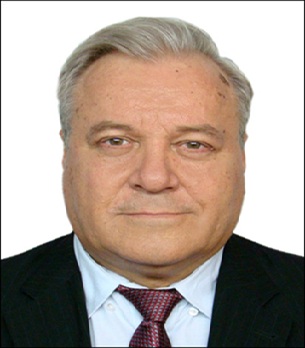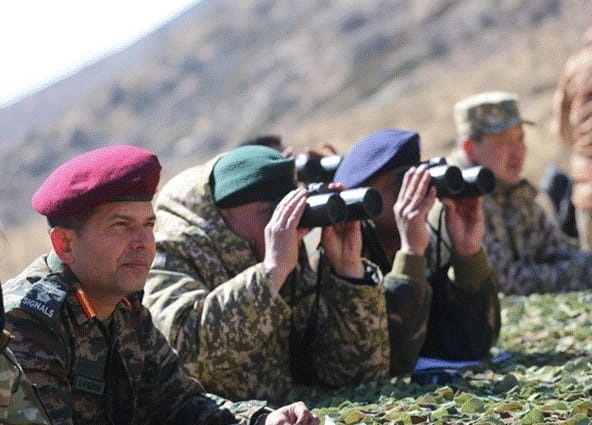
India’s PM Narendra Modi being briefed about the gifts of medical equipment from India to Field Hospital, Kyrgyzstan in Bishkek, 2015.

Kyrgyzstan is optimistic about further expanding and strengthening its cooperation with India. The two countries enjoy mutual trust and have a strong cultural basis to their relationship. In coming years, the trajectory of India-Kyrgyzstan relationship will move in a positive direction.
Introduction
Central Asia is a vast region. Due to India‘s (especially Northern India‘s) geographical proximity with Central Asia from the ancient times till the British occupation of India there was cross-regional and social interaction which led to forging of highly significant linkages. For many centuries Central Asia was an immense reservoir of human energy and skills where many conquerors and many religions left their still unextinguished marks.
Indian links with Central Asia and vice versa have not been completely continuous. For some centuries they were interrupted, sometimes very significantly, as in the case of the Kushana period, and sometimes, less so. Zia ul-Din Nakhshabi, the author of “Tuti-name” (“Book of Parrot”) was born in Central Asia. Al-Beruni came here, learnt Sanskrit and wrote Tarikh-I- Hind (The History of India). Abdurazzak Samarkandi also came here. Ibn Sina and Al-Khorezmi were acquainted with Indian scientific works.
The Silk Route, which connected China, Europe and India, passed through Central Asia including the Kyrgyz Republic. Two-way movement of trade and culture continued during Mughal rule and thereafter. Alexander Burnes, the British Agent, wrote that turbans of Punjabi white cloth were used by “whole of the natives of Bokhara and Toorkistan” during the 1830s. There were about eight thousand Indian settlers in the 19th and early 20th century in Central Asia. Every market and village in Turkestan had Hindu moneylenders in the 1860s according to an observer. Indians had a monopoly of the book trade there.
The post-1991 era
During the Soviet era, India and the then Kyrgyz Republic had limited political, economic and cultural contacts. Following the independence of Kyrgyz Republic on 31st August, 1991, India was among the first countries to establish diplomatic relations on 18th March 1992.
Warm, close and friendly bilateral relations have developed between the Kyrgyz Republic and India over the years. Bilateral ties have been raised to the level of strategic partnership in 2019. The two countries enjoy mutual support, respect, friendship and trust. Kyrgyzstan and India share such common values as development and democracy. Kyrgyzstan and India also have strong cultural ties.
Recently, India-Kyrgyzstan relations have strengthened and expanded in several areas including education, defence, security, trade and investment. They have
significant potential for expansion.
The trade turnover between the Kyrgyz Republic and India in 2022 amounted to almost 118 million US dollars but fell to about $96 million in 2023. The relevant authorities of both countries are analysing the reasons for the decline. One of the reasons is a decrease in sugar imports from India. However, bilateral trade is still well below its potential. Kyrgyzstan and India hope that with the start of several developmental projects with grant support from India, the volume of trade will increase.
Political Consensus
Kyrgyzstan and India are engaged in an active political dialogue at all levels and closely cooperate at the regional and global levels on important international issues of mutual interest. Both countries are working to further deepen and strengthen mutual cooperation in the United Nations and other international organisations in order to preserve and develop global peace and stability.
The first India-Central Asia Summit (ICAS) was held on 27th January 2022 in virtual mode at the initiative of the Prime Minister of India Narendra Modi. All the five Presidents of the Central Asian Republics, including President of the Kyrgyz Republic Mr. Sadyr Zhaparov, participated in the ICAS. A Declaration was adopted at the Summit which has identified multiple areas of cooperation between India and the Kyrgyz Republic. Apart from the India-Central Asia Dialogue mechanism at Foreign Ministers level, the Ministers of Trade and Culture of India and the Kyrgyz Republic meet at regular intervals to take forward cooperation in these areas.
Regular meetings of the Secretaries of the Security Councils to discuss security developments in the region also take place. Kyrgyzstan and India also share common concerns on the threats from terrorism, extremism and drug trafficking.
India and the Kyrgyz Republic are now closely cooperating in the Shanghai Cooperation Organization (SCO). The Kyrgyz side has welcomed the membership of the Republic of India in the Shanghai Cooperation Organization (SCO), noting that this has strengthened the Organisation. India's participation in the SCO also provides additional opportunities for the two sides to engage with each other in multilateral fora.
India chaired the SCO Council of Heads of State for the first time in 2023, and the Kyrgyz Republic simultaneously chaired the SCO Council of Heads of Government. The Kyrgyz Republic has made significant contributions to the Voice of the Global South Summits that were convened by India in January and November 2023 and August 2024.

India-Kyrgyz Joint Special Forces' Exercise Khanjar held in Kyrgyz Republic, 2023. | Indian Embassy in Bishkek.
Military Cooperation
Work to deepen military-technical cooperation is expanding. Important aspects of bilateral defence cooperation between the Kyrgyz Republic and India include the training of Kyrgyz military personnel at Indian defence institutions, joint exercises, exchange programmes and joint research at the Kyrgyz-Indian Mountain Biomedical Research Centre in Bishkek.
Military cooperation between the two countries in these areas is growing. The first meeting of the Joint Working Group in the field of defence was held in March 2023 in which a number of issues of mutual interest were discussed.
Economic Cooperation
In recent years, Kyrgyzstan and India have shown mutual interest to actively develop cooperation in the field of industry. This is of particular importance for Kyrgyzstan, given that India has achieved significant success in industrial production, including ferrous metallurgy, mechanical engineering, light and chemical industries, energy, among others.
The Kyrgyz Republic is interested in establishing joint ventures of household appliances, medical and laboratory equipment, development of software for Kyrgyz computing complexes and development of technology and supply chains for computer equipment, data storage systems, telecommunications equipment and industrial automation systems which can become possible areas for the digitalisation of industry. Akylbek Japarov, Chairman of the Cabinet of Ministers of the Kyrgyz Republic, recently said that Kyrgyzstan is moving to a large-scale industrialization of the economy with hundred industrial facilities to be built every year.
The Kyrgyz Republic has welcomed the initiative of India to intensify the activities of the Working Group on Cooperation in the Field of Textile Industry by holding its first meeting recently. Work to increase human resources and capital in industrial production is important for Kyrgyzstan. In this regard, the proposal of the Indian side to create Technological Incubation Centers aimed at developing the potential of industrial companies, improving skills in various fields, such as machine tool building, solar energy, robotics, is very relevant and timely.
Conclusion
Kyrgyzstan is optimistic about further expanding and strengthening its cooperation with India. The two countries enjoy mutual trust and have a strong cultural basis to their relationship. In coming years, the trajectory of India-Kyrgyzstan relationship will move in a positive direction.
(Exclusive to NatStrat)